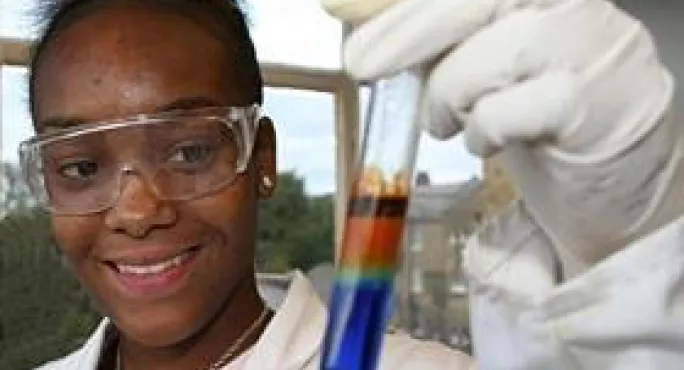Practical problem

A major shake-up of education funding could dramatically cut the number of schools offering science A levels, because they will no longer receive extra money to run expensive practical courses, leading scientists have warned.
The reforms run the risk of courses being axed, fewer resources being made available for experiments and schools employing cheap and inexperienced staff, according to a group including the Royal Society, the Institute of Physics, the Royal Society of Chemistry and the Society of Biology.
The concerns have been raised in a letter to the government, made public today, which says they are “extremely concerned” that the funding changes “will have detrimental effects on the offering and uptake of science A levels”.
“We know that the government supports and encourages the uptake and quality of the sciences at school; so the likely negative impact of these changes would clearly be unintended - but no less real,” according to the letter from the group, known as Science Community Representing Education (Score).
The row has broken out over government plans to simplify the funding of 16-19 qualifications, which will see all academic and some vocational courses receive the same amount of money from September. The formula is based on funding students, not qualifications.
Previously, academic qualifications were funded according to the cost of delivering them, with science receiving 12 per cent more than other subjects. From September, the current funding streams will be abolished, with non-science courses being brought up to the same level. Scientists fear this will create an incentive for schools to offer comparatively cheaper subjects.
“The sciences are practical subjects and therefore more expensive to run, requiring the upkeep of laboratory facilities, purchase of equipment and consumables and continued support for technician staffing,” states the letter, written by Score chairman Graham Hutchings, professor of physical chemistry at Cardiff University. “On a purely financial basis, the removal of the 12 per cent weighting for science academic qualifications is likely to discourage schools and colleges from offering these more costly subjects.”
The letter also raises concerns that the new funding arrangements could limit the number of A-level courses students can take (see panel, left). Even if schools continue to offer science A levels, the loss of extra funding will mean fewer resources for science departments, the scientists warn.
“Almost certainly this will result in science departments following one or more of: cutting teaching time, reducing the resourcing of practical work, or employing less experiencedcost-effective staff to deliver the practical work,” the letter states.
The warnings about science A levels come after the government has attempted to promote the study of single sciences at GCSE, with the English Baccalaureate performance measure.
At A level, small sixth forms and schools with small- to medium-sized science groups will be particularly vulnerable to the funding changes, it is feared, as will institutions with large science departments that will be subject to “severe funding cuts”.
The Association of School and College Leaders has also expressed its concerns to the Department for Education about the impact of the changes on science and other subjects that previously received more money, including design and technology, according to deputy general secretary Malcolm Trobe.
“The government has gone for a very simplified funding system but this also makes it difficult,” he said. “We need to recruit more people qualified in science and technology subjects for the economic well-being of the country, so it does seem unusual that there is no incentive to ensure there is a range of provision and courses readily available in schools and colleges.”
Richard Green, chief executive of the Design and Technology Association, said it was already “increasingly problematic” for schools to fund practical academic subjects. “We are fighting against so many disincentives and it is increasingly difficult for schools to make courses viable,” he said. “The introduction of the EBac has marginalised technology subjects. If there are fewer pupils taking them, and going through to take them after 16, a lower intake will also have an impact.”
The DfE will announce the funding levels for 16-19 subjects this spring, but has pledged transitional funding for three years to protect schools and colleges.
“The changes to the 16-19 funding system should not impact on the number of students wanting to study science,” a spokesman said. “We have simplified the current complex system to fund schools and colleges more fairly. We want to increase the number of young people studying the subject at A level.
“We’re investing up to pound;135 million over the next few years to support this. We are also attracting top science graduates to become teachers with tax-free bursaries of up to pound;20,000.”
`Perverse incentives’
Planned reforms to the funding of 16-19 qualifications will limit the number of hours of study for which students are funded. The government said that this will remove “perverse incentives”, which can lead to pupils taking too many easy qualifications.
But in its letter, Score said it is concerned that the change could limit the number of A levels students are able to take. “Mathematics and further mathematics AS and A levels are natural additional subjects for any science programme of study at 16-19, and it would be wrong (and we do not believe it is the government’s intention) to discourage a provider from offering these combinations of four or five A levels,” it said.
TES has previously noted the concerns of schools and colleges that they will not be able to compete with the independent sector for places at top universities if the new funding rules stop students taking more than three A levels.
Original headline: Funding overhaul could force schools to drop science A levels
Keep reading for just £1 per month
You've reached your limit of free articles this month. Subscribe for £1 per month for three months and get:
- Unlimited access to all Tes magazine content
- Exclusive subscriber-only stories
- Award-winning email newsletters
